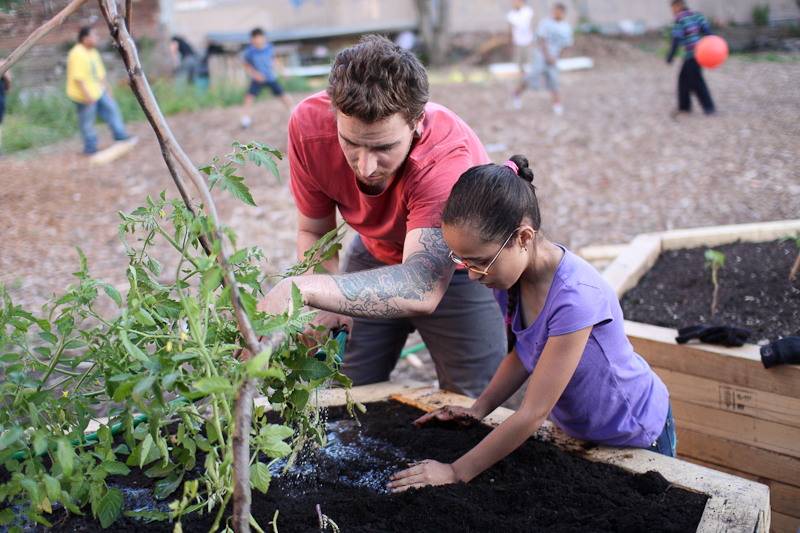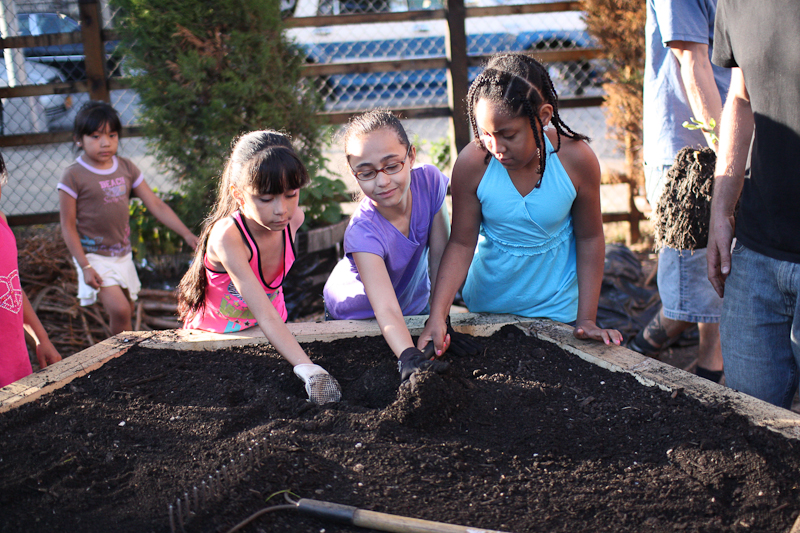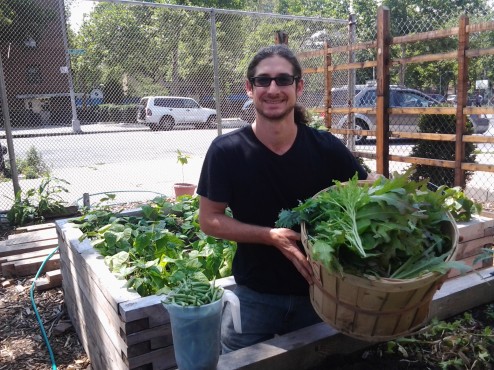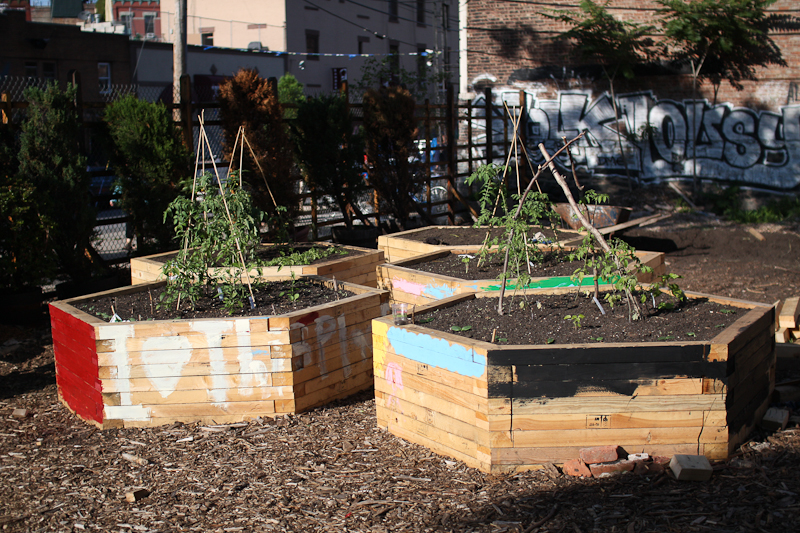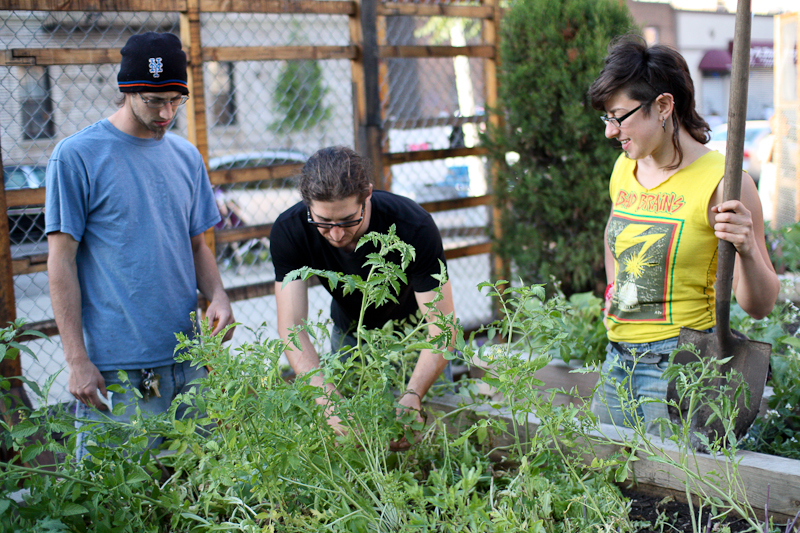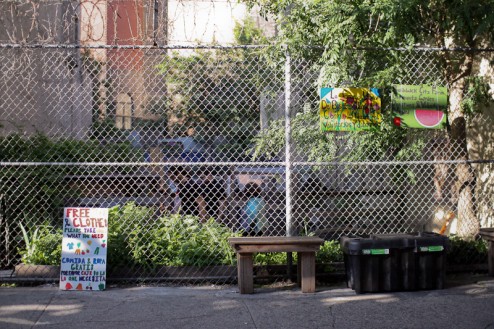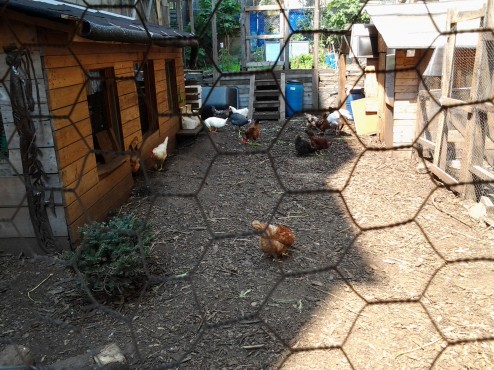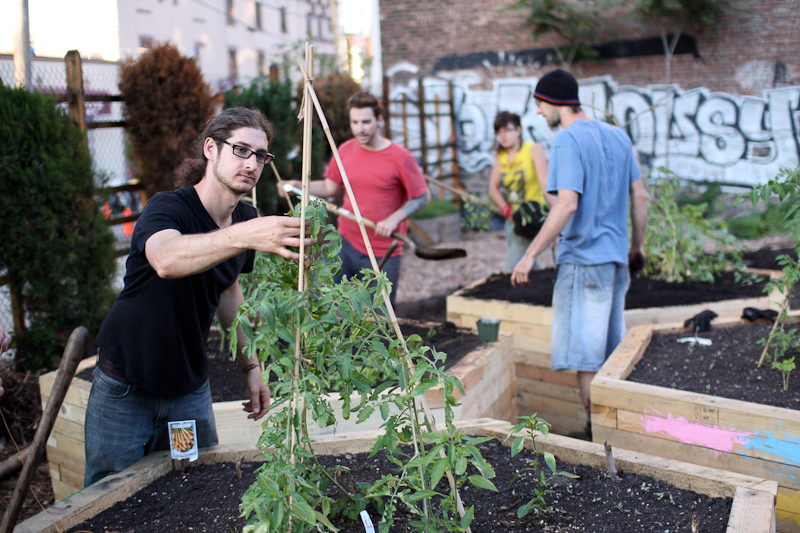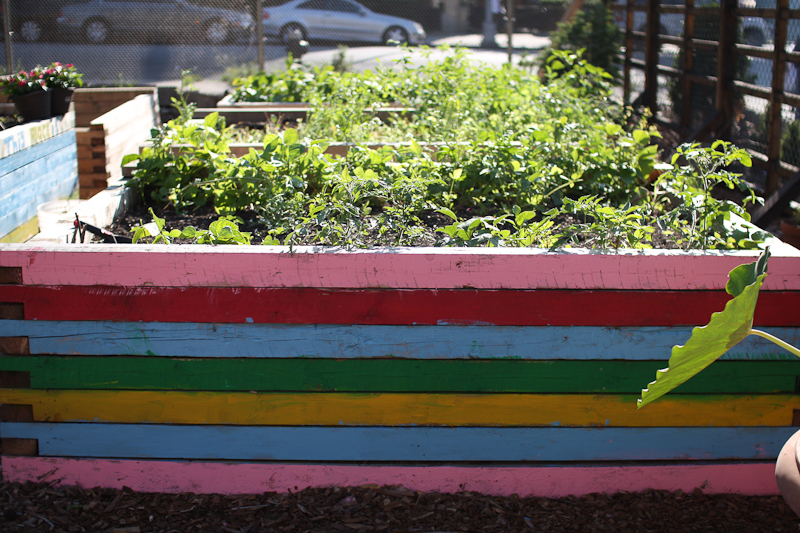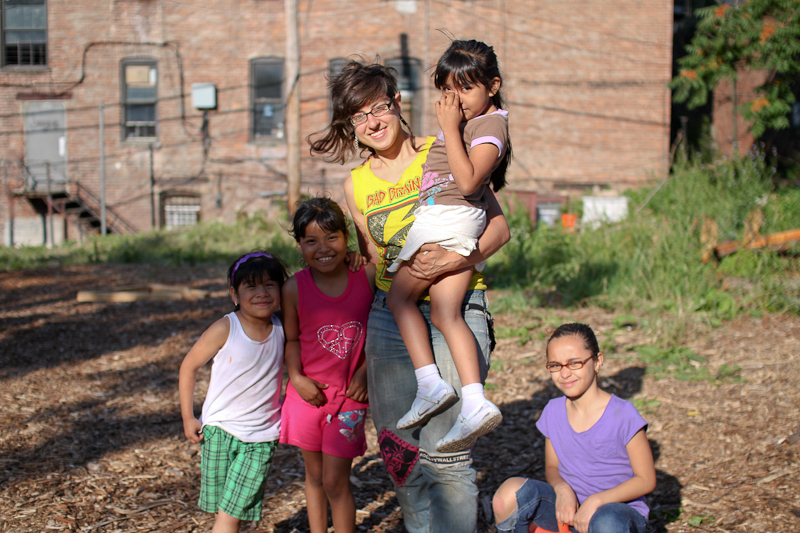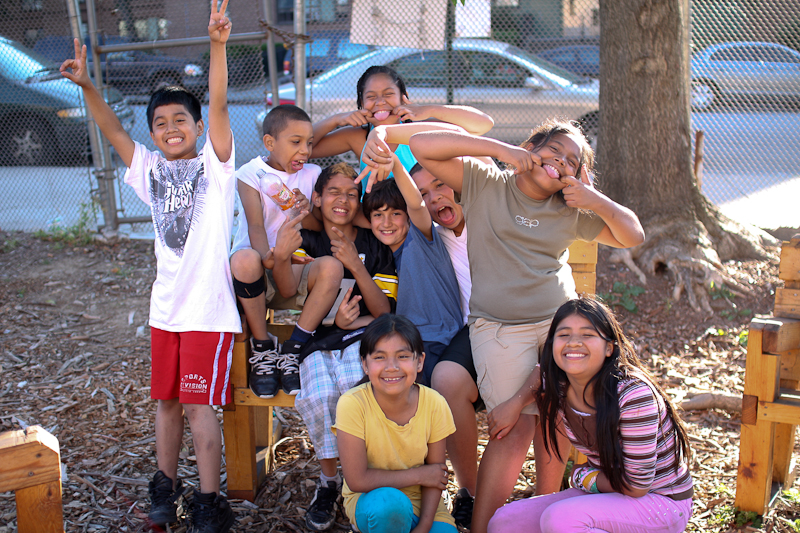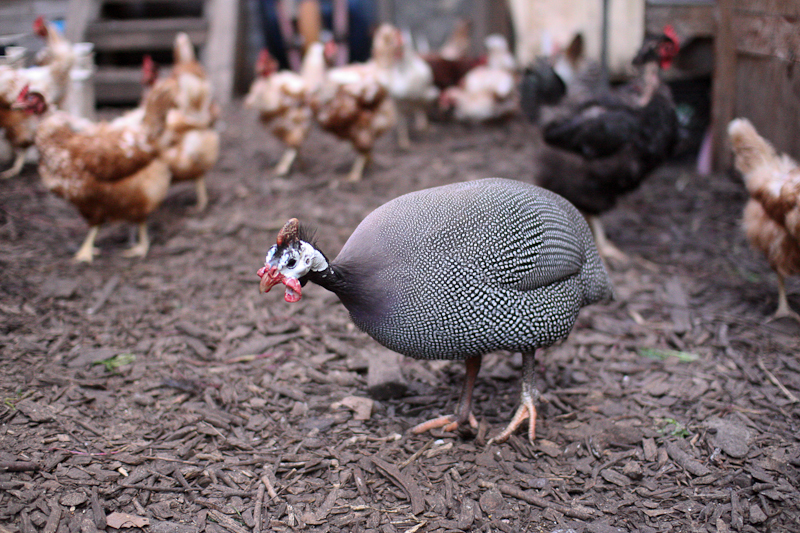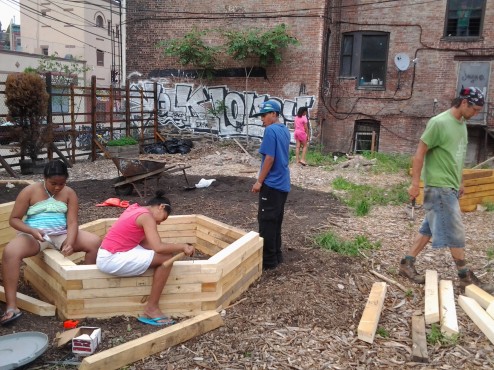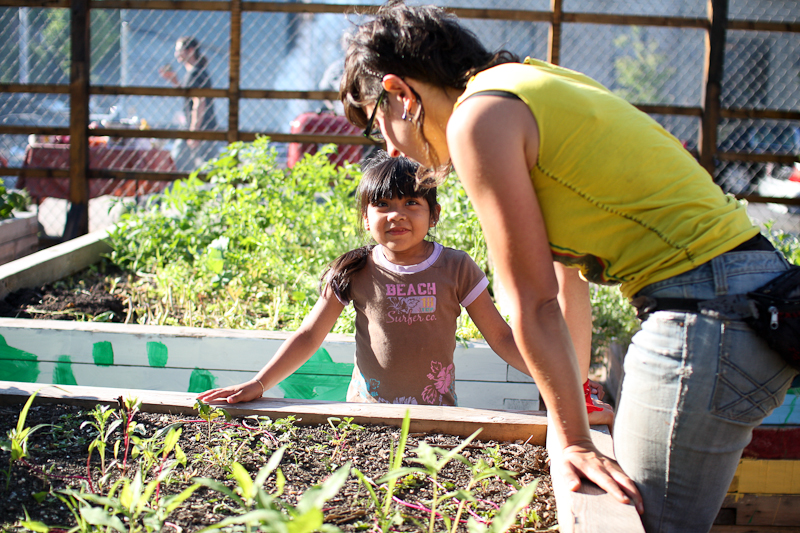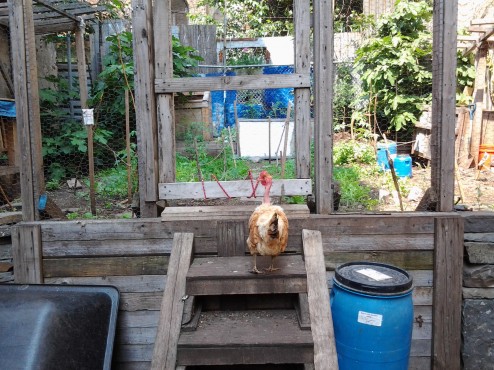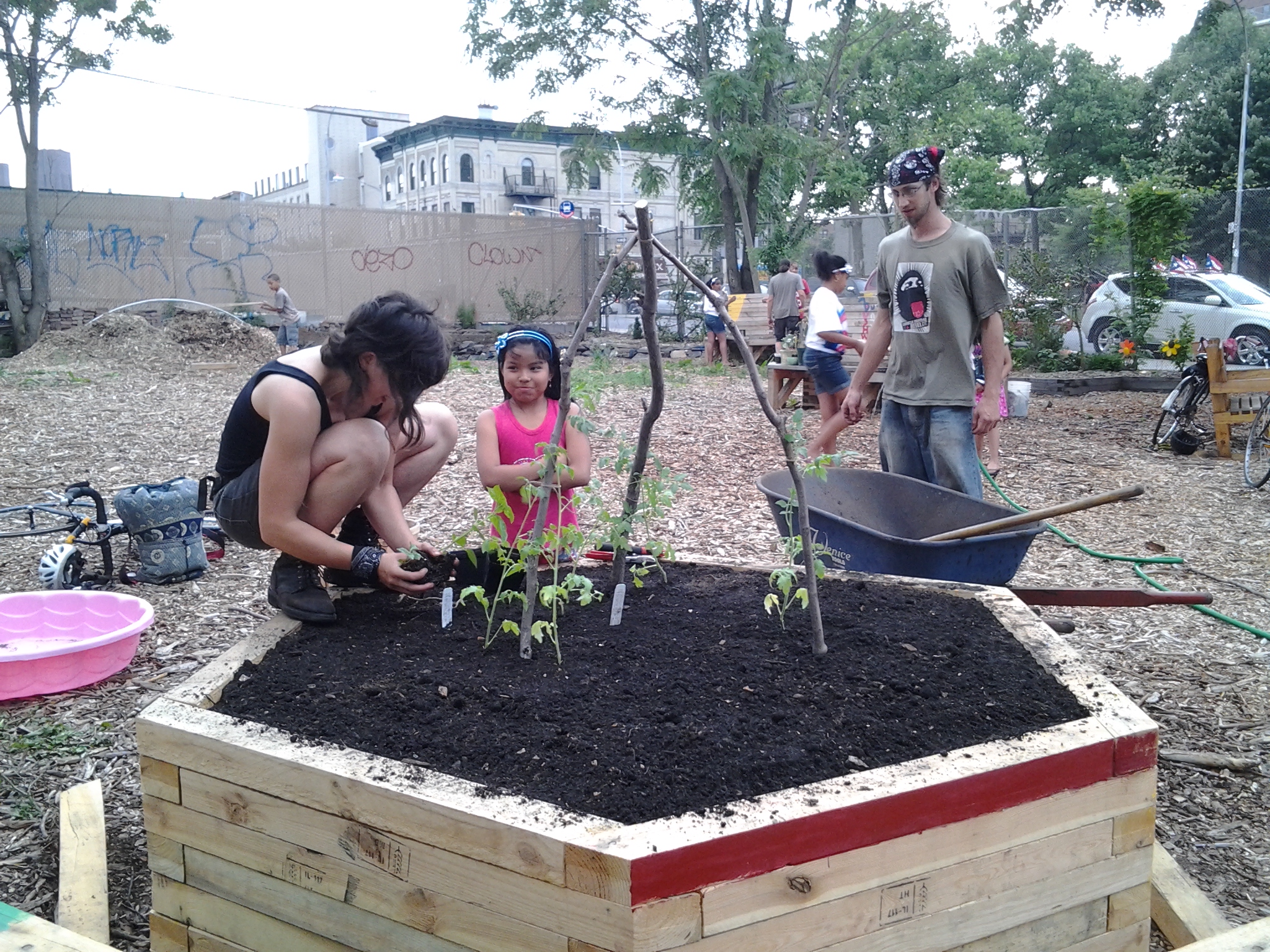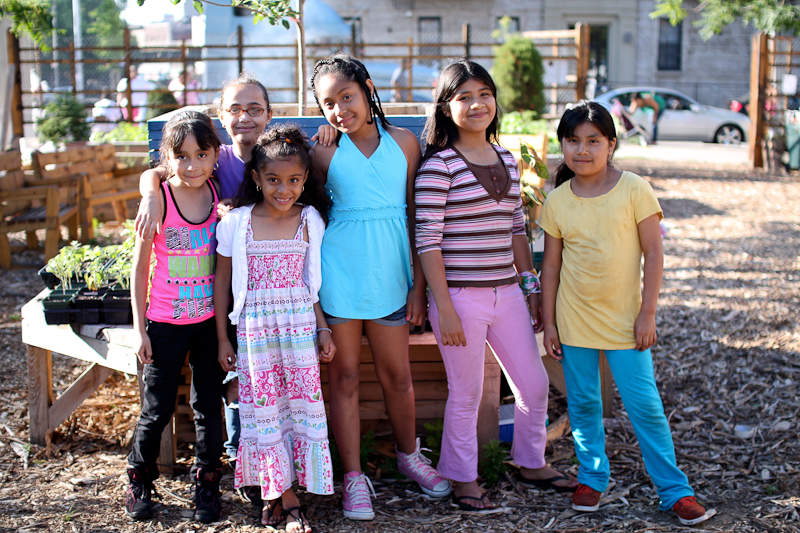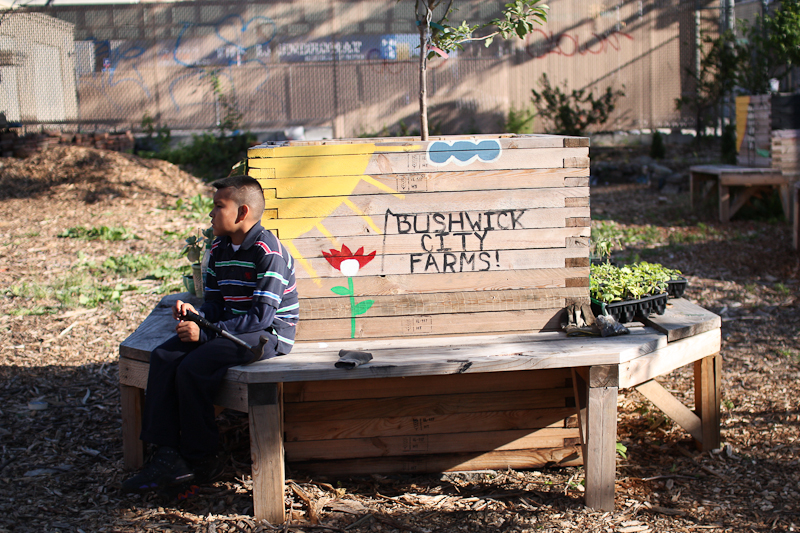bushwick city farms
space type: community farm | neighborhood: bushwick | active since: 2008 | links: website, facebook, twitter
The first thing my sister Laurel told me about Bushwick City Farms was that being a volunteer there went a tremendous way toward assuaging her gentrifier guilt about living in Bed-Stuy. “As soon as I unlock the gate, a dozen kids come running out of the housing projects nearby, asking if they can plant seeds, or paint planter boxes, or just play tag in the space,” she said. “And the parents come by every day to thank us for what we’re doing for the community, and for keeping an eye on their kids.” My experience was the same. The kids are so eager to help that we couldn’t do any of the planting ourselves—they practically grabbed the seeds out of our hands. And when I talked to some of the adults in the area—who were barbecuing on the sidewalk, and insisted on giving me a heaping plate of grilled chicken, sausages, and rice and beans—they reiterated how happy they were about the farm as a safe community space.
Bushwick City Farms is really one of the most beautiful projects I’ve had the pleasure of profiling. Like Trees Not Trash, they’ve appropriated two abandoned lots (so far), and they’ve filled them with fowl—chickens, ducks, guinea hens, even a turkey—and gardens. They’re growing more than fifty different fruits, vegetables, and plants, and the entire yield is given out to the community. They’ve got a small version of the Free Store outside of one farm, where people can take or leave clothes, small appliances, and other household goods. In the past they’ve offered ESL classes in the farms, and the spaces serve as a gathering place for members of the community, as well as an opportunity for food education—one day we were harvesting and passing out arugula, and we watched many people try the spicy green for the first time.
The project is entirely volunteer run, and nearly everything has been donated. They’re always looking for more helping hands, so head on out to see them if you’d like to participate in this incredible project. But first, read my interview with Vinnie, Jason, Aneta, and Laurel.
brooklyn spaces: How did this all get started?
Vinnie: My wife Masha, the founder, got permission from the owner of the lot on Broadway to use it as a community garden, and she and the original group of volunteers came in and started cleaning the place out. Shortly thereafter, Jason and I got involved, and other people started helping out, and little by little we started building and expanding. The goal was always to produce fresh, organic food for those in the community, and to provide a space that people could come in and enjoy. We also want to provide food education, to bring people back to basics as far as where food comes from, how to grow and produce it responsibly, and how to eat healthy.
Jason: People are so out of touch with where their food comes from, how food is grown, and what types of food you should be eating.
brooklyn spaces: What was the lot like when you got here?
Vinnie: It was overgrown by weeds, and it had been used as an illegal dumping site for years, so it was completely full of garbage. It was a year before it started really looking like something.
brooklyn spaces: What did you start with?
Vinnie: We had chickens and some container gardens. The garden itself went through a kind of a metamorphosis over the first couple of seasons. We didn’t really know what we were doing; a lot of it was a learning process. We didn’t know about the extent of the contamination in the soil, and we had built smaller beds that didn’t have enough depth to them, which were taken apart eventually.
brooklyn spaces: What’s the soil contaminated with?
Jason: Everything. A hundred years of building and collapsing and building and collapsing.
Vinnie: Dumping too. The Stockton lot has been both an apartment building and a gas station in the past, and then it was vacant for two or three decades. It’s basically a landfill; there’s no real soil. It’s mostly cement, brick particles, and garbage.
Jason: There was a tent city, and people had been living in there up until like 2009. Apparently there was a crazy fight, some guy bashed someone’s head in with a shovel, and then there was a fire and their huts burned down, so it was vacant when we went in there.
brooklyn spaces: When was that?
Jason: Earth Day 2011. We’d had our eye on it for a while, and we just decided to go in and start cleaning it out. We spent a long time bagging up trash, raking up the rubble, cleaning it up. We planted some flowers that first day, and then later we built the fence and got some container gardens started. We just started slowly building it up.
brooklyn spaces: So you didn’t have prior permission to be in the Stockton space the way you did with the one on Broadway?
Vinnie: No, we just went in and did it. Eventually the manager contacted us. He asked us to write a proposal to the owner, and we did that, and we were given permission to stay. Most people, if they’re not using the land, are pretty open to the idea of community gardens. Or at least that’s been our experience so far.
brooklyn spaces: What was the reaction from the community?
Vinnie: People loved it, the kids especially. They really love the chickens.
brooklyn spaces: Where did the chickens come from?
Vinnie: The first ones came from the pollo de vido, the live poultry shop on Myrtle. Since then we’ve gotten more from there, and a lot of the birds have been donated. The turkey was left here on Thanksgiving; we never saw who brought it.
brooklyn spaces: And what about all the building materials and things? Where did all that come from?
Vinnie: We get different things from people in the community: grocery stores have donated produce, gardening companies have given us leftover plants, landscaping companies gave us all the woodchips. There’s a company that ships huge stones, and they have these pallets that are only good for one use, so we get all of our wood from them.
brooklyn spaces: What all do you have growing now?
Vinnie: Oh, there’s so much. We have spinach, kale, all kinds of lettuce, radishes, carrots, tomatoes…
Jason: Cucumbers, green beans, cilantro, basil, mint, eggplants, a fig tree…
Vinnie: Roses, apple trees…
Jason: Pear trees, peach trees, nectarines, plums, peppers, elephant ears—just tons and tons of stuff.
brooklyn spaces: And all the food gets donated to the community?
Jason: Yeah. Sundays at 2 o’clock we do distribution, we give out the eggs from the chickens and whatever we’re harvesting that week. The food is given out on an as-needed basis, but we don’t check credentials or anything. We trust people to need what they take and take what they need.
brooklyn spaces: How many people are involved in keeping this going?
Jason: There’s a core group of about ten volunteers who come to work here almost every day, but if you include all the kids in the neighborhood and everyone who stops by to help out when they can, we probably have more than fifty people.
brooklyn spaces: What are your goals for the future?
Vinnie: Probably by the end of the summer we’ll be thinking about expansion, going into other lots, getting schools involved, doing more educational programs.
brooklyn spaces: What’s the most rewarding part of this for you?
Aneta: I like that people get really excited about it. People are so thrilled, like, “Wow, I’ve never seen a live chicken before!” That’s really fascinating and rewarding. People are happy, really happy to see this.
Vinnie: It reminds a lot of people of where they’re from, so it’s really nice to see their reactions. And the kids just love it. It’s really great to work with the kids.
Jason: For a kid to see something go from seed to harvest is unbelievable, that’s so cool. And they’re more likely to want to eat what they’ve planted, so we’re planting seeds in a lot of different ways.
Laurel: I think the community-building is my favorite part. Providing a space to bring people together and to meet their neighbors. It’s a diverse neighborhood, and I think it’s great to challenge boundaries and remember that people are people.
Like this? Read about more community spaces: Time’s Up, Body Actualized Center, Boswyck Farms, Books Through Bars, No-Space, Trinity Project, #OccupyWallStreet art show
